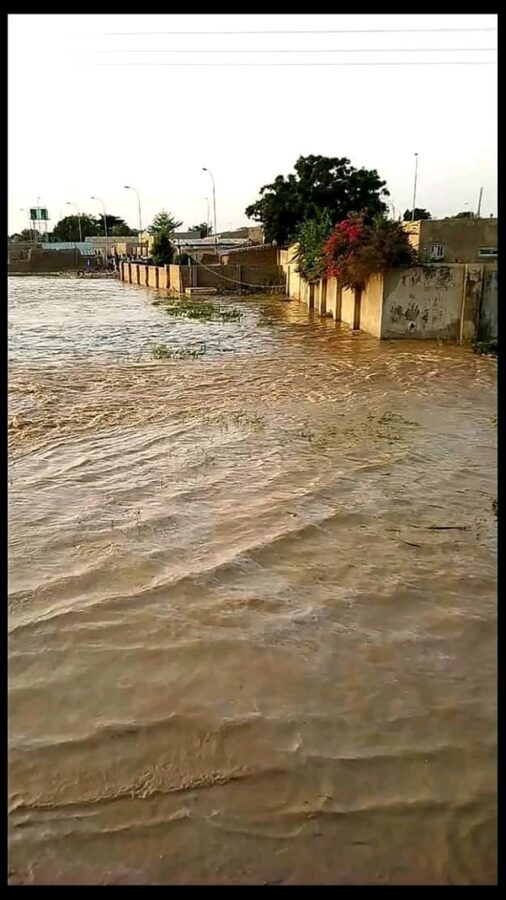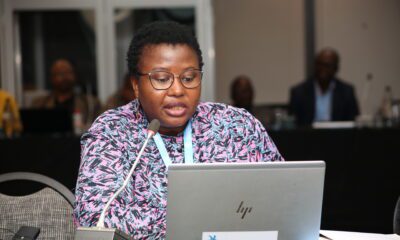National Issues
Are We Ready To Fight The Next Flood Losses? -By Abdu Abdullahi
Flooding will not end its perennial devastations as long as the governments cannot facilitate the development of a functional and effective mechanism to curb it. It is significant here to cite some of the great damages caused by flooding in some parts of the country in 2020. For instance, it was reported that farmers in the Northern Nigeria lost more than two million tons of rice, representing a quarter of the country’s projected harvest.

“Floods are the acts of God, but flood losses are largely acts of man.”
It is imperative to begin this piece with the above quotation because it solicits our deep reflections on the aftermath of flood disasters that have caused great havocs on the people in some parts of the country, especially the Northern region. The core message is that the level of flood catastrophe largely depends on our proactive responses or otherwise.
But before going straight into the discussion, I would like to refer to an article that I wrote entitled:’ Recurrent Floods: Open Letter to Northern Governors,’ which was published in the Triumph newspaper of Friday, October 16, 2020. It was a fresh and passionate appeal to our leaders to accord flooding the seriousness it deserved at that time owing to the enormous damages it caused.
Just two years after that reminder however, the natural disaster has reared its ugly head again and has been responsible for loss of lives and substantial devastations of agricultural produce. This is a clear sign of food insecurity that will have negative effects on our economy as many farmers have already started counting their losses after investing hugely on their farms. The pathetic situation will have multiplier repercussions considering the fact that the lingering insecurity has already displaced many farmers of their means of livelihoods as perpetuated by the brutish bandits.
The presidency has confirmed that 2022 floods have killed 115 Nigerians. In Jigawa State alone, 50 people have died of floods. The overall situation has revealed that 500,000 people have been affected, 73,370 displaced and 277 injured. The response of the presidency is that it will continue to provide assistance to individuals and communities hit by the disaster but we have not been told what the presidency will do to minimize future occurrence.
Flooding will not end its perennial devastations as long as the governments cannot facilitate the development of a functional and effective mechanism to curb it. It is significant here to cite some of the great damages caused by flooding in some parts of the country in 2020. For instance, it was reported that farmers in the Northern Nigeria lost more than two million tons of rice, representing a quarter of the country’s projected harvest. In Kebbi state in the same year, the agricultural commissioner Attahiru Maccido told news men that the state lost one billion naira worth of rice and other farm produce to ravaging flood in different parts of the state.
It was also disheartening to hear the Kebbi State Emergency Management Agency( SEMA) saying farmers had lost more than five billion naira worth of farm produce to floods in the state in 2020. According to the Daily Trust of September 3, 2020, rice and maize farmlands were the most affected in different parts of the North. These are just few examples drawn from previous experiences of flooding. But with these and other uncited instances, what lessons did the authorities learn that might have culminated in the setting into motion appropriate measures to avert future tragedy?
Flooding threatens sustainability because it adversely affects our economy, social and environmental health. It is for this reason that Nigeria is a signatory to the UN Sustainable Development Goals and of course, flooding impacts on many of the SDGs. ‘ Zero Hunger’ is the goal number two of the SDGs which aims at ending hunger in all forms by the year 2030. Thus, the food and agricultural sector is the key in eradicating hunger but is heavily and negatively impacted by flooding in some parts of the country, washing away large quantities of farm produce. Also, ‘ No Poverty’ is goal number two and is hallucination because flooding has destroyed farm produce, resulting into the drastic fall of the farmers’ income.
Just like in the previous years prior to the commencement of each raining season,the National Meteorological Agency( NIMET) provided seasonal rainfall predictions that flooding would be impending for proactive measures to avert or at least assuage the emerging losses of flooding. But who cared to listen and promptly swing into action?
Regrettably, it has now become a normal but disenchanting routine that after each year’s flooding, the custordians of power express ‘deep’ sympathy to the victims, offer them some palliatives and counsel them to take the calamity as an act of God. The same prosaic tale is repeated over and over again devoid of significant value and urging us to resign to fate for the next damages.
Flood during raining season is caused by many factors such as increased precipitation linked to climate change, poor urban planning etc. Unlike some other natural disasters, rainfall flooding can be controlled and it is incumbent to put hands together to ensure a paradigm shift from pessimism to optimism. On the part of the authorities, the driving factor to confront this phenomenon is active deployment of a very strong political will that ignites people’s hopes and supports their dignity.
Probably unknown to some people, there is the Flood Risk Management ( FRM) strategy that has been evolved to address the problems of the Nigerian environment with emphasis on flooding. Its main task is reducing the likelihood and impacts of flood. It also includes the predictions of flood hazards, socioeconomic factors and consequences, as well as measures and tools for risk reductions. However, critics have concluded that the FRM is not living up to its expectations probably because of the Nigerian experience, that is, the government is more concerned with providing funds for post- disaster flood response than releasing funds for pre- disaster.
From other country’s experiences therefore, we can draw a case study from India in its protective efforts to combat perennial flooding. The main thrust of the flood in the form of physical ( structural) measures was meant to prevent the flood ways from reaching potential damage centres and modifying susceptibility to flood damage through early warning systems. The structural measures adopted for the flood protection included constructions of embankments, flood walls, dams and reservoirs, natural detention basin, drainage improvement and diversion of flood waters. These measures proved to be a successful story. But in Nigeria, the best the authorities could do is mobilizing the people through the media to clear drainages of filthy materials to allow easy flow of water!
It is hoped that the affected authorities will dwell on the outcome of flooding, giving it a disaster meaning, rather than the flooding itself so that further destructions can, at least, be minimized to the barest minimum.










